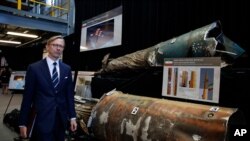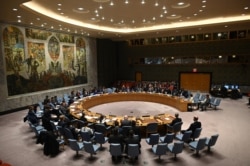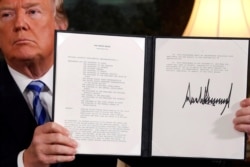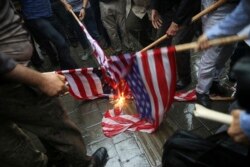The United States is pressing ahead with plans to push for the extension of a U.N. arms embargo against Iran that is due to expire in two months under the 2015 nuclear deal, but it is likely to face stiff opposition from other nations, including Russia and China.
“We have an objective to extend the arms embargo,” U.S. Special Envoy for Iran Brian Hook told reporters in a phone briefing Thursday. “That can be done the easy way, or it can be done the hard way, but it’s going to be extended.”
Council diplomats said the U.S. might push for a vote on its draft resolution seeking the extension early next week, but it may not have the necessary nine votes to pass it or to force Russia and China to veto.
Washington’s case for extending the ban on conventional weapons is one of national security, arguing that Iran is a bad actor that perpetuates conflict and spreads terrorism, often through its proxies in the Middle East and beyond.
“It [the arms embargo] has been in place for 13 years. Iran has still been able to move a lot of weapons around the Middle East to its proxies in the gray zone,” Hook said. “If this is what Iran has been able to accomplish in the dark, imagine what they will be able to accomplish in broad daylight.”
Warning from Hook
Hook, who announced Thursday that he was stepping down after a two-year tenure, warned that an Iran unshackled from restrictions would lead to further regional destabilization, intensified conflicts and a regional arms race.
“The U.S. draft resolution is an extremely tough text that Washington knows China and Russia at least will reject out of hand,” said Richard Gowan, International Crisis Group’s U.N. director. “The draft got a very cool reception from the rest of the council when the U.S. first floated it in June.”
In addition to renewing restrictions on selling weapons or related materiel to or buying them from Iran, Washington goes further, seeking authorization for nations to have the right to search, seize and dispose of prohibited cargo. The draft would also impose asset freezes and travel bans on designated individuals and entities.
“Council members have been very wary of engaging with the U.S. on this resolution, because they are not sure the Americans really want to find a deal on the arms embargo,” Gowan said. “They suspect that the U.S. is just using this as a prelude to an attempt to snapback U.N. sanctions on Iran and push the JCPOA [Joint Comprehensive Plan of Action] into a terminal crisis.”
The JCPOA is the 2015 Iran nuclear deal. "Snapback" refers to the process that would trigger the reimposition of previous U.N. sanctions on Tehran.
Terms of deal
Under the JCPOA, the five permanent Security Council members — Britain, China, France, Russia and the United States — plus Germany agreed with Iran to gradually lift international sanctions in return for limits on its nuclear activities that would prevent it from making a nuclear bomb. It also reopened Iran’s markets to many foreign investors.
But under President Donald Trump, the U.S. withdrew from the deal in May 2018 and reimposed unilateral sanctions. It also made it more difficult for Iran to export oil and for other countries to do business with Iran. Tehran responded by resuming some of its nuclear activities, and in July 2019 it breached the deal by exceeding limits on both uranium enrichment and stockpile levels.
Iran has always denied its nuclear activities are for military purposes.
The U.S. move to extend the arms embargo has already had strong pushback from other council members. Russia and China have been vocal for months that they would not support an extension.
On Thursday, China’s U.N. mission repeated that stance on Twitter, saying the “U.S. draft resolution goes against international justice & multilateralism” and predicting the Security Council wouldn't support it.
In July, Russian Foreign Minister Sergey Lavrov said any attempt to renew the arms embargo indefinitely had no legal ground.
Allies at odds
And while the three European members of the deal — Britain, France and Germany — agree in principle with U.S. concerns about Iran’s destabilizing regional activities, they diverge over Washington’s “maximum pressure” strategy and its withdrawal from the deal, and have worked hard to keep the agreement from completely falling apart.
Strong support for the U.S. draft from the elected members of the Security Council is also not guaranteed.
“Some council members may try to float a milder alternative resolution extending the arms embargo temporarily,” ICG’s Gowan said. “But it will be very hard to find a compromise that the U.S. on one side and China and Russia on the other can accept.”
If the U.S. draft fails to pass and a compromise text is not reached, Washington would likely invoke the snapback mechanism. But that would be controversial, since it withdrew from the deal two years ago and some countries will question its right to trigger that process under the Security Council resolution that enshrined the nuclear deal in international law.
Council diplomats have expressed concern that however the issue moves forward, it has the potential to be messy and do damage to the body’s credibility, while worsening existing divisions.







